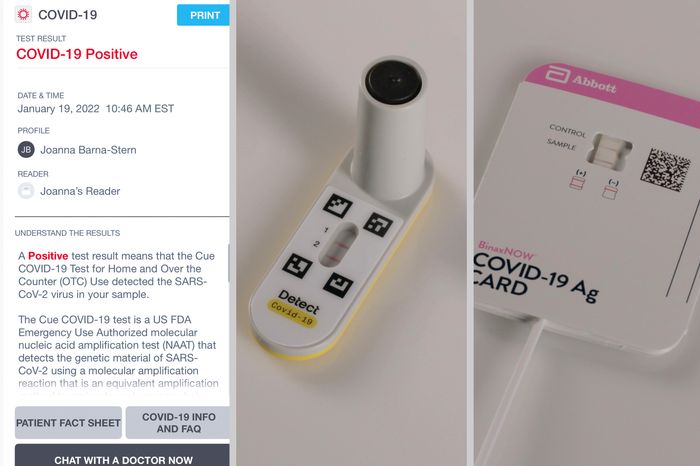It’s Friday and you’ve got a scratchy throat and a mild headache. Time to play “Cold? Covid? Or Just Crazy?”—the only game more popular than Wordle.
Or you could open up your medicine cabinet and power-on a small white box. Swab your nose with a Lego-like stick, then slide that into the illuminated gadget. About 20 minutes later, your iPhone buzzes: “COVID-19 Positive.”
The future? Nope, it’s already here. For the past few weeks, I’ve been testing the Cue Health Monitoring system and the Detect Covid-19 Test, two systems from health-tech startups that put lab-like molecular testing right on your bathroom counter. No driving to the testing center. No waiting in line. No anticipating the results for days.
I recently had Covid-19. I didn’t catch it to test these systems, but I happened to have them on hand when I started feeling symptoms. (I’m out of isolation now and feeling much better. Thanks for asking.)
As Omicron has surged, at-home testing has become key to stopping the spread of the highly contagious variant. But while at-home rapid antigen tests are convenient and affordable (and sometimes free from the U.S. government), pricier molecular tests—such as PCR tests—are more sensitive and able to spot the virus earlier. The Detect system, which isn’t PCR but works similarly, reported I was positive on Friday, while an antigen test taken at the same time said negative. I confirmed the result with a laboratory PCR test.

Joanna’s positive Covid tests: The Cue system, which sends results to the paired app, left; the Detect system, middle; and Abbott’s BinaxNow rapid antigen test, right.
Photo: Joanna Stern/The Wall Street Journal
This accuracy comes with a price. The Detect and Cue work like a Keurig—you own the machine, but you have to stock up on single-use test pods. The Detect Hub is $39; each test is $49. The Cue Reader is $249; a pack of three tests is $225. Meanwhile, at-home antigen tests cost $20-something per two-pack.
Are the pricier, more-accurate options worth it? If so, which one do you get? To answer those questions, I had to ask a bunch of other questions.
First, how do molecular and antigen tests differ?
Molecular tests (specifically, for you science nerds, nucleic-acid amplification tests) use chemicals and equipment to amplify a sample’s genetic material billions of times to spot traces of the virus. I like to picture a mini Sherlock Holmes holding a magnifying glass to my snot.
An antigen test, on the other hand, pushes your nose-swab sample onto a paper laced with antibodies to detect viral protein. Those tests might not detect an early-stage Covid-19 infection, but they can tell if you’re carrying a lot of the virus. Some medical professionals call them “contagiousness tests.”
OK, so are molecular tests better than antigen tests?
No one said that! “We have to really be thinking, ‘What is the tool that’s going to do the job we care about?’ ” Michael Mina told me. He’s an epidemiologist and chief science officer at eMed, a company that authenticates and verifies at-home testing.
Molecular tests’ biggest benefit: They can spot Covid earlier—anywhere from 6 hours to two days, depending on the variant and other factors. Dr. Mina, who previously served as an adviser to Detect, said they’re good “if you’re really symptomatic and you definitely want to know, ‘Is this Covid?’ ”
However, if you’re using a test to determine whether you can safely go out into the world—back to work, back to school—the cheaper rapid antigen test would be best. “The problem with a molecular test is that it’s so sensitive that it may detect dead fragments and not live virus,” said Peter Chin-Hong, an infectious-disease specialist at the University of California, San Francisco.
This was the case for me. Even 12 days after I showed my first symptoms, when I was feeling all better, Cue and Detect said I was positive. The antigen tests showed me as negative by day nine.
How do home molecular tests work anyway?
The Detect test has so many steps you start to feel like a lab tech.

The Detect Covid-19 molecular test requires a fair amount of gear and user involvement; thankfully, an app guides you through how to use it all.
Photo: Detect
After you swirl the included swab around your nostril, you stir it in a test tube with a special liquid for 15 seconds. Then you place an enzyme-filled cap on the tube and shake it like a bottle of salad dressing. You place that tube in the Detect Hub for about 55 minutes, where the machine heats the sample for optimal results.
The Detect app—which mercifully includes a step-by-step guide—will alert you when the tube is ready to be taken out.
Almost there! Now you squeeze more liquid from a dropper into a reader. You place your test tube in the chimney of the reader. The sample pours into the reader and…you wait 10 more minutes for your result. One line means you’re negative, two means you’re positive.
Well, that’s a lot. How about the Cue?
If Apple made a home-testing kit, it’d be more like the Cue. This is perhaps why Google, the National Basketball Association, Major League Baseball and other organizations are distributing Cue systems to various personnel. Put the test cartridge into the Cue Reader, swab your nose with the fancy stick, then stick the stick into the cartridge. Your part is done.

To use the Cue Reader test, swab your nose with the stick, then put it into the cartridge sitting in the Reader device; the result pops up on an app on your smartphone.
Photo: Cue Health
Inside the box, your sample combines with an enzyme. The Cue Health app, connected to the Reader via Bluetooth, tells you how much time is left of the 20-minute process. When time is up, the result pops up in the app.
(Another at-home molecular test, the $75 Lucira CheckIt, is also simple to use, but I didn’t have it at the start of my Covid symptoms.)
Can I really trust the results of these systems?
In the wake of the Theranos trial, it’s fair to be concerned about lofty-sounding claims made by tech startups about miniaturizing lab diagnostics, but medical experts I spoke with said these systems aren’t revolutionary new approaches, just streamlined versions of proven ones.
And the companies cited external validation and review by the Food and Drug Administration. In clinical studies, the Detect demonstrated 97.3% accuracy compared with a PCR test. An independent study by the Mayo Clinic showed the Cue test matched lab results with 97.8% accuracy.
Can these detect variants such as Omicron?
The Cue and Detect tests can detect Omicron, Delta and all other known Covid-19 variants, the companies said.
Chief executive of Detect, Hugo Barra, explained if a future variant wasn’t detected by the current test, the company would just need to update that enzyme-filled cap.
Should I trust these companies with my data?
Detect doesn’t collect any data about you. You don’t even need to open an account to take the test, nor do you have to report your results through the app (although you can if you want).
Cue requires an account and shows your results via the app. Ayub Khattak, Cue Health’s CEO and co-founder, told me the company doesn’t share or sell your data to third parties, and that any collected data is de-identified and used only to spot Covid-19 transmission trends.

Cue’s $90-a-month subscription includes unlimited certified travel test results.
Photo: Cue Health
Can I use these results for travel?
Both companies offer to proctor tests via video chat for an additional fee, after which they provide valid certification via email to share with your airline or airport security. Detect charges $20 extra for each test. Cue has a $90-a-month subscription, which includes unlimited, certified travel test results and in-app access to doctors, plus 20 test packs each year. Other companies, including eMed, verify antigen tests for travel.
Oof, those prices! So what should I do?
Cue and Detect may soon tell you if you’re sick with something else. The companies are also working on ways to test at home for flu. That’s really the promise of both—our very own personal-health diagnostic computers. Hopefully, like PCs, the price will come down.
For now, those price tags currently hold them back from being as useful as rapid antigen tests. Dr. Mina said the most effective test is the test you can take more often. If cost is an issue, the answer is the $20-something kits sold at CVS and Walgreens.
SHARE YOUR THOUGHTS
How much would you be willing to spend on a next-generation, at-home Covid test? Join the conversation below.
If your company isn’t paying for your kits, your initial investment—or subscription commitment—for molecular home testing is steep. (Since at-home testing can be covered by insurance, check with your insurer, or try to submit claims for reimbursement.)
The Detect Hub isn’t as high-tech, but it’s a solid middle ground. It’s only $39, and Mr. Barra told me the price of the $49 tests will eventually go down—even though they often sell out at that price. So I bought one. I like the idea of having a highly accurate test in my home, whenever I feel the urge to play “Cold? Covid? Or Just Crazy?”
—For more WSJ Technology analysis, reviews, advice and headlines, sign up for our weekly newsletter.
Write to Joanna Stern at [email protected]
Copyright ©2022 Dow Jones & Company, Inc. All Rights Reserved. 87990cbe856818d5eddac44c7b1cdeb8








